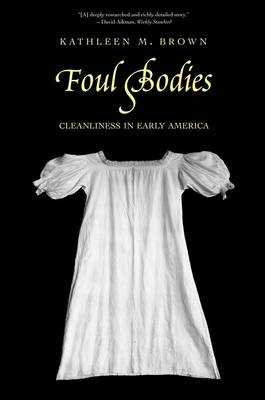
Foul Bodies
Cleanliness in Early America
Seiten
2011
Yale University Press (Verlag)
978-0-300-17155-6 (ISBN)
Yale University Press (Verlag)
978-0-300-17155-6 (ISBN)
- Titel ist leider vergriffen;
- Artikel merken
States that a nation's standards of private cleanliness reveal much about its ideals of civilization, fears of disease, and expectations for public life. Starting with the shake-up of European practices that coincided with Atlantic expansion, this title traces attitudes toward 'dirt' through the mid-nineteenth century.
In colonial times few Americans bathed regularly; by the mid-1800s, a cleanliness “revolution” had begun. Why this change, and what did it signify?
"It is the author's ability to appreciate and represent the almost tactile circumstantiality of life that makes Foul Bodies so special—and so readable."—Charles E. Rosenberg, author of Our Present Complaint: American Medicine, Then and Now
"Brown has framed an intriguing new area of research and gathered a surprisingly rich source of textual evidence. Marvelous."—Laurel Thatcher Ulrich, author of A Midwife's Tale: The Life of Martha Ballard, Based on Her Diary, 1785-1812
A nation’s standards of private cleanliness reveal much about its ideals of civilization, fears of disease, and expectations for public life, says Kathleen Brown in this award-winning cultural history. Starting with the shake-up of European practices that coincided with Atlantic expansion, she traces attitudes toward “dirt” through the mid-nineteenth century, demonstrating that cleanliness—and the lack of it—had moral, religious, and often sexual implications. Brown contends that care of the body is not simply a private matter but an expression of cultural ideals that reflect the fundamental values of a society.
The book explores early America’s evolving perceptions of cleanliness, along the way analyzing the connections between changing public expectations for appearance and manners, and the backstage work of grooming, laundering, and housecleaning performed by women. Brown provides an intimate view of cleanliness practices and how such forces as urbanization, immigration, market conditions, and concerns about social mobility influenced them. Broad in historical scope and imaginative in its insights, this book expands the topic of cleanliness to encompass much larger issues, including religion, health, gender, class, and race relations.
In colonial times few Americans bathed regularly; by the mid-1800s, a cleanliness “revolution” had begun. Why this change, and what did it signify?
"It is the author's ability to appreciate and represent the almost tactile circumstantiality of life that makes Foul Bodies so special—and so readable."—Charles E. Rosenberg, author of Our Present Complaint: American Medicine, Then and Now
"Brown has framed an intriguing new area of research and gathered a surprisingly rich source of textual evidence. Marvelous."—Laurel Thatcher Ulrich, author of A Midwife's Tale: The Life of Martha Ballard, Based on Her Diary, 1785-1812
A nation’s standards of private cleanliness reveal much about its ideals of civilization, fears of disease, and expectations for public life, says Kathleen Brown in this award-winning cultural history. Starting with the shake-up of European practices that coincided with Atlantic expansion, she traces attitudes toward “dirt” through the mid-nineteenth century, demonstrating that cleanliness—and the lack of it—had moral, religious, and often sexual implications. Brown contends that care of the body is not simply a private matter but an expression of cultural ideals that reflect the fundamental values of a society.
The book explores early America’s evolving perceptions of cleanliness, along the way analyzing the connections between changing public expectations for appearance and manners, and the backstage work of grooming, laundering, and housecleaning performed by women. Brown provides an intimate view of cleanliness practices and how such forces as urbanization, immigration, market conditions, and concerns about social mobility influenced them. Broad in historical scope and imaginative in its insights, this book expands the topic of cleanliness to encompass much larger issues, including religion, health, gender, class, and race relations.
Kathleen M. Brown is professor of history, University of Pennsylvania, and author of Good Wives, Nasty Wenches, and Anxious Patriarchs: Gender, Race, and Power in Colonial Virginia. She lives in Merion Station, PA.
| Erscheint lt. Verlag | 31.5.2011 |
|---|---|
| Reihe/Serie | Society and the Sexes in the Modern World |
| Zusatzinfo | 35 b-w illus. |
| Sprache | englisch |
| Maße | 156 x 235 mm |
| Gewicht | 517 g |
| Themenwelt | Geschichte ► Allgemeine Geschichte ► Neuzeit (bis 1918) |
| Geisteswissenschaften ► Geschichte ► Regional- / Ländergeschichte | |
| Geschichte ► Teilgebiete der Geschichte ► Kulturgeschichte | |
| Studium ► 2. Studienabschnitt (Klinik) ► Hygiene / Mikrobiologie / Virologie | |
| Sozialwissenschaften ► Soziologie | |
| ISBN-10 | 0-300-17155-2 / 0300171552 |
| ISBN-13 | 978-0-300-17155-6 / 9780300171556 |
| Zustand | Neuware |
| Informationen gemäß Produktsicherheitsverordnung (GPSR) | |
| Haben Sie eine Frage zum Produkt? |
Mehr entdecken
aus dem Bereich
aus dem Bereich
Geschichte einer wilden Handlung
Buch | Hardcover (2024)
C.H.Beck (Verlag)
CHF 47,60


